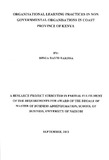| dc.description.abstract | Learning is the ultimate sustainable competitive advantage for organizations because no
one can undercut, duplicate or take it. Organizational learning explores ways to design
organizations so that they fulfil their function effectively, encourage people to reach their
full potential, and, at the same time, help the world to be a better place. Organisational
learning is central to organisations ability to adapt to changes in its internal or external
environment and remain competitive in times of uncertainty.
The objectives of this study were to determine organization learning process(s) within
NGOs in Coast province, Kenya; and to establish challenges in implementation of the
learning organisation concept among the NGOs operating in Coast province, Kenya.
This study adopted survey design targeting all 75 NGOs that had been operating in the
Coast province of Kenya for a period not less than two years. The main type of data was
discrete quantitative data. Data was collected using a semi-structured questionnaire which
was self administered as well as through email. Frequencies and percentages were used to
establish the status of the proportion of the respondents’ agreement or disagreement with
the learning attributes. Mean scores were also computed.
The study established that most NGOs had adopted organizational learning practices
albeit with varying degrees of successes and challenges. The organisations are very
strong in accessing external learning, gathering internal experience, drawing conclusions
and communications systems but relatively weak in integrating policy into strategy,
developing organisational memory and applying the learning. The study therefore
recommends that the organizations should ensure that their learning does not only
influence the current members, but also future members by appropriately documenting
the experiences, beliefs, and norms that are accumulated along the way to enable sharing
with wider readership. It is not just enough to learn, the ultimate test lies in applying the
learning to improve practice. Therefore organisations should actively create, capture,
transfer, and mobilize knowledge of all its members and apply it to enable the
organisation to adapt to the increasingly dynamic environment. | en |

